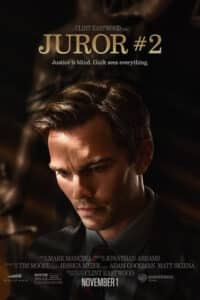
Juror #2
Justin Kemp’s got a lot going on. He’s getting ready to be a dad—his wife’s pregnant—and then he gets called to be a juror in this sketchy murder case on the edge of Savannah, Georgia. Basically, some dude killed someone, and now Justin has to figure out what really happened.
The victim was Kendall Carter. Everyone says she got beaten up and left for dead by her boyfriend, who’s trying to turn over a new leaf after being in a gang. It’s the perfect story for the jurors and the prosecutor, especially since there’s an election coming up.
But here’s the kicker: While sitting there listening to all this, Justin starts piecing together memories about something that might have gone down a year before—a night when he thought he hit a deer with his car on that same road. Justin’s memories start creeping in, and he’s hit with this thought—what if he’s not as innocent as he always believed?
Now he’s stuck. Does he say something and risk everything, or keep quiet and let someone else take the fall?
Clint Eastwood’s behind this movie. At 94 years old, he’s still going strong and dives right into all these twists between truth and facade without wasting any time. “Juror Number 2” plays games with these ideas until everything’s flipped upside-down.
This movie really digs into what people see and don’t see. You’ve got a bride with a blindfold, a main character who can’t see because of a storm, a witness who’s too far away to catch everything, and even a prosecutor whose career blinds him. It’s all right there in the open, clear as day with great cinematography, but folks just aren’t noticing what’s obvious.
The film goes deeper than just telling you what’s right or wrong; it’s about how well we notice the facts before jumping to conclusions. Clint Eastwood takes us through the ins and outs of picking jurors in America. It reminds me of Sidney Lumet’s style in “The Jurors.” Each juror brings their own beliefs to the table, wrestling with themselves and each other. But here’s the twist: The best juror—the one who feels like Henry Fonda and wants justice—is actually the guilty one.
The movie reveals through flashbacks that juror number 2 might be where all this trouble started. As things ramp up, guilt and doubt weave through the jury like an intense game of whodunit.
This movie really dives deep into a different kind of tension, thanks to Jonathan Abrams’ clever script. Instead of keeping us on the edge with suspense about what happens next, it focuses on the inner turmoil of its main character. So, everyone except Justin thinks the accused is guilty, but Justin feels so guilty himself that he’s trying hard to buy some time and persuade these jurors who just want to wrap things up.
We’re thrown into a situation where justice has seemingly done its job and even cops get involved to prove their point. There’s this retired cop in the mix, who had to back off from jury duty because he couldn’t stay impartial—a nod to Clint Eastwood’s style where lawmen often bend the rules. Played by J.K. Simmons, this guy reminds us of those classic tough-cop roles, but he’s really just passing through in this story.
The spotlight is on ‘Juror Number 2,’ who sort of knows how everything’s going down and digs into this murky scenario where ideal notions of justice clash with messy human emotions. You’ve got a young woman fired up by her own experiences fighting sexism and an educator haunted by his past losses seeing gang ties in the accused’s tattoo. Each juror is trying to uphold some kind of ideal justice, battling with their own backstories.
To watch movies and TV shows online, please sign up with our partner, a legit streaming service.
Get Started ➔






